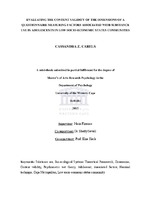| dc.contributor.advisor | Florence, Maria | |
| dc.contributor.advisor | Savahl, Shazly | |
| dc.contributor.advisor | Koch, Elize | |
| dc.contributor.author | Carels, Cassandra Z. | |
| dc.date.accessioned | 2014-06-10T12:30:13Z | |
| dc.date.available | 2014-06-10T12:30:13Z | |
| dc.date.issued | 2012 | |
| dc.identifier.uri | http://hdl.handle.net/11394/3305 | |
| dc.description | Magister Psychologiae - MPsych | en_US |
| dc.description.abstract | Substance abuse is recognised as one of the greatest health and social problems in South Africa (SA). There is a need to explore the problem of substance use in the South African context in terms of the Bio-ecological Systems Theoretical Framework. All of the reviewed local and international studies on instruments that are used to measure factors associated with adolescent substance use, while yielding useful information; do not adequately address the issues of an instrument that successfully includes all the levels of the Bio-ecological Systems
Theoretical Framework at the dimension level. As a result, a need for an applicable
instrument exists. The overall purpose of the current study was to evaluate the content validity of the dimensions of the proposed self-administered questionnaire in terms of the Bio-ecological Systems Theoretical Framework, which will assist the factors associated with youth at risk of substance abuse in low socio economic status communities in the South African context. The study was framed in psychometric test theory focusing specifically on the procedures for content validation. It is being increasingly recognized that the development of a valid test requires multiple procedures, which are employed sequentially, at different stages of test construction. Validity is thus built into the test development from the outset. Participants were selected by means of purposive sampling. The sampling method was appropriate since the participants were required to meet certain inclusive criteria. The participants comprised of two groups of community leaders within two different communities on the Cape Flats. An adapted version of the Nominal Group Technique method was employed to collect data. The data for aim one was collected using a self administered questionnaire (Content Validity Questionnaire) consisting of two sections. The first section was presented in the form of a ranking scale with all relevant factors associated with adolescent substance use. The second section of part 1 was in the form of open-ended questions. The second aim was collected in the form of focus groups. Data was analysed quantitatively and qualitatively in the relevant sections. Data collected from the Content Validity Questionnaire (CVQ) was analysed quantitatively by means of statistical analysis
making use of frequencies, and the open-ended questions of the content validity and data from the focus groups was analysed qualitatively by means of thematic analysis. The study concluded that all factors presented in the CVQ are important factors associated with adolescent substance use in the two low socio-economic statuses communities that were analysed in both the quantitative and qualitative components of the study. | en_US |
| dc.language.iso | en | en_US |
| dc.publisher | University of Western Cape | en_US |
| dc.subject | Substance use | en_US |
| dc.subject | Bio-ecological systems | en_US |
| dc.subject | Theoretical framework | en_US |
| dc.subject | Dimensions | en_US |
| dc.subject | Content validity | en_US |
| dc.subject | Psychometric test theory | en_US |
| dc.subject | Adolescent | en_US |
| dc.subject | Associated factors | en_US |
| dc.subject | Nominal technique | en_US |
| dc.subject | Cape Metropolitan | en_US |
| dc.subject | Low socio-economic status community | en_US |
| dc.title | Evaluating the content validity of the dimensions of a questionnaire measuring factors associated with substance use in adolescents in low socio-economic status communities | en_US |
| dc.type | Thesis | en_US |
| dc.rights.holder | University of Western Cape | en_US |

